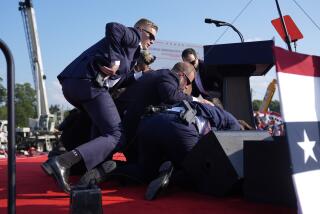National Security Council Shouldn’t Be in the Covert-Operations Business
- Share via
The National Security Council is in the news for reasons that can only startle old NSC hands. It is caught up in controversy over its role in conducting a series of covert operations, notably the program of military aid to Iran in exchange for help on release of Americans held hostage in Lebanon.
Capitol Hill is calling once again for arrangements to make the President’s assistant for national-security affairs accountable to Congress. Both the Administration’s actions and congressional proposals are badly mistaken.
How did the National Security Council, a presidential policy advisory body, get into the business of conducting secret operations? In the period from its establishment in 1947 to the end of the Eisenhower Administration in 1961, the NSC was what it appeared to be--a Cabinet-level committee designed to advise the President on issues involving the integration of military, foreign and domestic policies relating to U.S. national security.
Beginning in 1961 with the Kennedy Administration and continuing to the present time, the emphasis has shifted from the role of the council to the role of its staff. An activist NSC staff became, in effect, the White House staff for national-security matters, and the President’s assistant for national-security affairs became the manager of the President’s national-security business. The council itself has become a less important body.
Until 1969, however, the emphasis was overwhelmingly on the advisory role of the staff. The staff and the assistant sought to ensure that the issues were addressed by the President on the basis of the best advice available. But they did not themselves, with some very minor exceptions, conduct foreign policy. Their roles were also largely played behind the scenes instead of in front of the cameras.
President Richard M. Nixon, however, wanted to run foreign policy directly out of the White House. His assistant for national-security affairs, Henry A. Kissinger, crossed two key lines--first between policy adviser and policy maker-implementer, and later between confidential assistant and public defender of policies. With Kissinger involved in secret Vietnam negotiations, back-channel diplomacy on strategic arms limitation, secret trips to China and arrangements for the Moscow summit meeting, the NSC apparatus had gone operational.
Since the days of Nixon and Kissinger, the NSC’s staff has acquired its own press-relations office and--especially under Robert C. McFarlane--has become actively involved in lobbying efforts on Capitol Hill.
The addition of a responsibility for covert operations, while a further extension of this historical evolution, is a major new departure. For several reasons it is a very bad one. It is one of the first precepts of covert operations that you keep them far away from the President’s office. The President should be able to honestly deny knowledge of specific activities. (President Reagan, of course, severely bent this rule when he began to make presidential speeches on behalf of “covert” aid to the Nicaraguan contras .)
As most Administrations have learned, the covert operators must be kept on a tight rein because they often come up with ill-thought-out proposals for action. Linking such operations directly to the President’s office and eliminating State Department review of covert-action proposals enhances the prospects for disaster, as we have been learning.
There is, moreover, a basic incompatibility between the NSC staff role in ensuring that the President hears a wide range of policy views and its involvement in implementing a particular set of policies or programs.
The apparent immediate reasons for this new departure are also bad reasons: It reflects a kind of hubris about the political invulnerability of the President; it is possible because the NSC staff now has its own covert operations specialist--Marine Lt. Col. Oliver North; it is a way of bypassing congressional oversight; it permits the White House to pursue certain favorite causes--such as contra aid, the overthrow of Moammar Kadafi and the release of hostages--in a more unrestricted way, but in dissociation from broader foreign-policy concerns.
If the practice is not stopped, it could seriously damage a system for the development of confidential policy advice that has been successful in meeting the varying needs of Presidents since Harry S. Truman.
Congress ought not to act to make the President’s national-security assistant subject to senatorial confirmation and require him or his staff to testify publicly on Capitol Hill. That would undermine their confidential advisory role and destroy their raison d’etre. Rather, Congress should consider revising the National Security Act of 1947 to make it absolutely clear that the role of the National Security Council and its staff must not include responsibility for conducting operations. Kissinger came to regret the shift to an operational role for the NSC; it is time to reverse that action.
More to Read
Sign up for Essential California
The most important California stories and recommendations in your inbox every morning.
You may occasionally receive promotional content from the Los Angeles Times.













